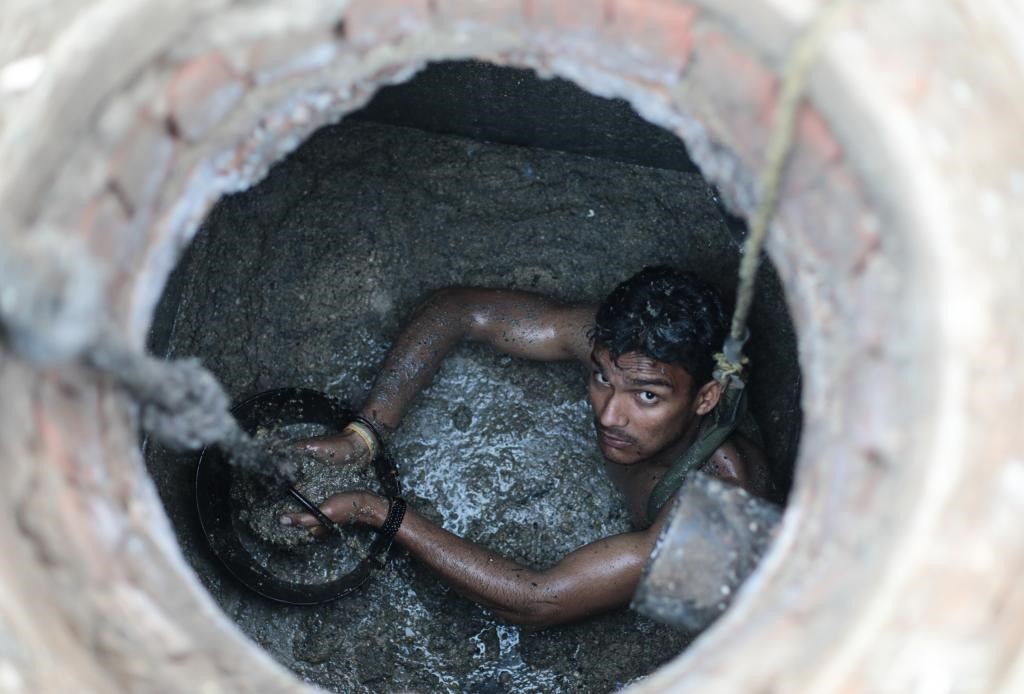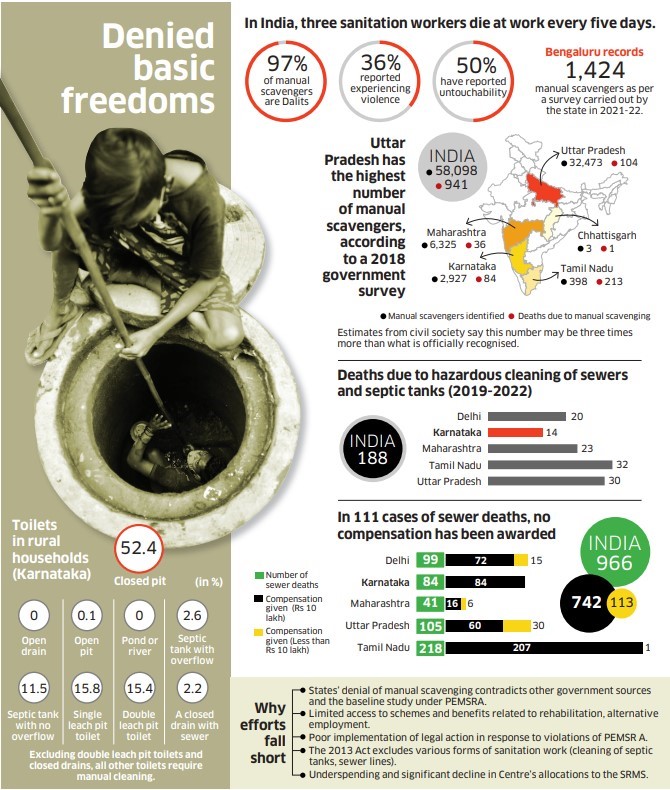
Disclaimer: Copyright infringement not intended.
Context
- The Union Ministry of Social Justice and Empowerment has now said that only 508 districts out of the total 766 districts in the country have declared themselves manual-scavenging free.
What is manual scavenging?
- Manual scavenging is the practice of removing human excreta by hand from sewers or septic tanks.
Constitutional provisions against manual scavenging in India
- Human dignity is an inalienable right which forms a part of the fundamental right to life (Article 21– Maneka Gandhi vs. Union of India) as per the Constitution of India.
- ‘Dignity’ has been construed to include equal treatment and protection of the law, and equal respect. It is a unanimously accepted right, validated by Articles 1, 22, and 23 of the Universal Declaration of Human Rights.
- The following is a list of provisions under the Indian Constitution which is supposed to cater to the rights of equality, respect, and dignity before the law.
- Article 14 is about equality before the law which should not be denied to any individual in India.
- Article 15 provides that no discrimination is permitted based on the place of birth of a person, race, religion, caste, and sex. Manual scavengers, however, face discrimination because of their caste all their lives.
- Article 16 of the Indian Constitution, in matters of public employment guarantees equal opportunity to all its citizens.
- Article 17 has provision for the abolition of untouchability, it is guaranteed under this constitutional provision to all.
- Article 19(1)(g) gives every citizen the right to practice any profession or to carry on any occupation, trade or business of their choosing.
- Article 21 guarantees the protection of life and personal liberty to all the citizens living in India.
- Apart from these, some other rights which safeguard the manual scavengers as SC or ST, under the Indian Constitution are Article 46 and Article 338.
.jpeg)
Laws pertaining to Manual Scavenging in India
Protection of Civil Rights Act, 1955 (Revised)
- Protection of Civil Rights Act, 1955 (Revised) which was applicable in 1977 abolished untouchability and made it a cognizable and non-compoundable offence. To convert poor urban household dry latrines into flush latrines, integrated low-cost sanitation schemes were authorized.
Employment of Manual Scavengers and Construction of Dry Latrines (Prohibition) Act, 1993
- This Act banned the employment of manual scavengers and made it a cognizable offense, making it the responsibility of the State, citizens and the organisations to maintain sanitary toilets.
Prohibition of Employment as Manual Scavengers and their Rehabilitation Act, 2013
- India banned the practice under the Prohibition of Employment as Manual Scavengers and their Rehabilitation Act, 2013 (PEMSR).
- The Act bans the use of any individual for manually cleaning, carrying, disposing of or otherwise handling in any manner, human excreta till its disposal.
- In 2013, the definition of manual scavengers was also broadened to include people employed to clean septic tanks, ditches, or railway tracks.
- The Act recognizes manual scavenging as a “dehumanizing practice,” and cites a need to “correct the historical injustice and indignity suffered by the manual scavengers.”
The salient features of this Act are as follows:
- The Act has provisions for prohibition and penalty of employing anyone as a manual scavenger.
- Under this Act, the states are now responsible for identifying and rehabilitating manual scavengers.
- The state also has to provide them with training, assistance, loans, and even houses.
- The Act prohibits the existence of dry latrines and other forms of insanitary latrines and to that effect makes the local authority responsible to identify dry latrines in the area and demolish or convert them into sanitary latrines.
The Prohibition of Employment as Manual Scavengers and their Rehabilitation (Amendment) Bill 2020
- The Bill prohibits the employment of manual scavengers, the manual cleaning of sewers and septic tanks without protective equipment, and the construction of insanitary latrines.
Status of Manual scavenging in India
Safai Karmachari Andolan Report
- 472 deaths due to manual scavenging had been recorded from 2016 to 2020.

Impact
Sewer Deaths In India
- The Union Ministry of Social Justice and Empowerment (MSJE), disclosed that 282 manual scavengers have lost their lives, while cleaning sewers, tunnels and septic tanks between 2016 and 2019. Even after various attempts of the officials for solving the problem of manual scavenging, is constantly increasing.
Manner Of Living
- Life of a sanitation worker is very difficult. They face a lot of racism during their whole life, same goes to their families.
Poverty
- A sanitation worker works throughout their lives with very low wages.
- As per an organisation Safai Karamchari Aandolan sanitation workers receives Rs. 180-200 per month, per household.
- They agree to work for long hours with very less wages from what the government prescribes.
- Further, while working in such unhealthy conditions that without any protective gears, leads to severe injuries and health issues.
Health Issues
- Average life expectancy of a sanitation worker is only 50 years old. Workers and their families face many diseases throughout their lives.
Social Disparity:
- People involved in the work of manual scavengers are from low caste and they are being considered as untouchable because of their work.
Many employer reject them from getting job, they do not get respect in society their children face the discrimination at schools

Why is manual scavenging still prevalent in India?
Social deprivation
- People who have been trapped in this occupation by birth have faced social stigma for generations and despite welfare measures and laws in place to uplift them, they haven’t been able to avail the opportunities because they have been shunned and despised. This results in people employed in this menial, inhuman, and degrading occupation to get deeper and deeper in it and carry on the practice for generations.
Poor enforcement of existing laws
- The lack of enforcement of the Act is one of the reasons why the practice is still prevalent in India.
The exploitation of unskilled laborers
- Example: The Mumbai civic body charges anywhere between Rs 20,000 and Rs 30,000 to clean septic tanks.
- The unskilled labourers, meanwhile, are much cheaper to hire and contractors illegally employ them at a daily wage of Rs 300-500.
Unorganized group
- Unlike most occupations where the labour workforce has unions, manual scavengers do not have an organized group or union because of which they do not have any noteworthy voice in the political process and hence the government in the country.
Lack of empathy
- One of the most important factors in this regard is the total lack of empathy towards the plight of the manual scavengers.
Lack of other employment opportunities and rehabilitation
- People continue this occupation because our society and system haven’t been able to rehabilitate these people or include them in the mainstream of our society.
Continuance of unsanitary latrines
- It is only lately that the country is awakening to living in hygienic conditions as their right, but still the country continues to have unsanitary latrines in which human waste is cleaned manually, instead of having a flush or running water to wash/drain from the waste. The cleaning of such latrines is done manually since they are dry toilets, not made properly.
Inadequate Rehabilitation and Less Employment Opportunities
- There are very few alternatives of employment opportunities available in the nation for this community, due to which this community has to enter into this occupation to earn bread and butter. Since, this work is a caste based low caste people are forced to do this work. They are not very much accepted in the other sectors.
Human Rights Watch, a global non-profit organisation, published a report on manual scavenging. In which they quotes a campaigner who said that The manual carrying of human faeces is not for a employment, but an akin to slavery.
Recommendations
- To end the problem of Manual Scavenging, it is obsessively necessary to work from the core of the problem.
Education
- Education plays a very important role here, Dr Bheem Rao Ambedkar has said- Cultivation of mind should be the ultimate aim of existence.
- In India, children of poor workers are not much educated. As they don't have sufficient funds for the education, they are forced to drop school/college and join the same line of employment.
- As a proposal, the government should give grants to every child a sum of money for passing every final semester exam (in government schools). This will motivate students to study more and also they will gather some amount which will be helpful for them.
Social awareness
- Nagar Palika, NGOs, Health Officers, and Social Communities should create awareness among the manual scavenger community regarding health issues, hygiene practices, and sanitization processes.
- Small workshops, events etc should be organised to thank this community and celebrate their honor of respect.
- Moreover, the general public should be aware of legal implications regarding employment of manual scavenging. Once, anybody is arrested for employing any manual scavenger, an example will be set for the rest of the society.
On the other hand sanitization workers should be also aware of their rights and laws to protect them from being exploited.
Rehabilitation and rejuvenate of Manual Scavengers
- It is very necessary to shift these workers to other jobs. More employment should be created and this community should be prioritised. When this community will be shifted towards other opportunities it will not only help to earn money but also to raise living standards.
- This employment not only affects the health of the workers but also destroys the life of their families. By providing them different opportunities to earn, it will also raise the living standards of their families.
Enforcement of laws
- Many of the laws are being enacted to protect the sanitation workers such as Employment Of Manual Scavengers And Construction Of Dry Latrines Act, 1993, Self-Employment Scheme for Rehabilitation of Manual Scavengers (SRMS) in 2007, The Prohibition Of Employment As Manual Scavengers And Their Rehabilitation Act, 2013 etc but when it comes to implementation, these laws have failed to show results.
- Government is reluctant to provide their promises, not giving adequate punishments to those who are violating the rules. As a result this taboo is still in practice and will not end till laws are being implemented properly.
Technology
The Greater Hyderabad Municipal Corporation has forged a robot named Bandicoot to replace humans. This robot has a camera on the front and it is able to enter inside septic tanks. This robot has two arms and four legs which are designed for performance cleaning operations. The robot can be handled with full sanitisation and it wont affect the health of a human. Robots can be the best alternative to manual scavenging.
Conclusion
I like the religion that teaches liberty, equality and fraternity, this beautiful line is said by Dr. Bheem Rao Ambedkar.
- The man who not only inspired to abolish discriminatiion but also known as The Father of Indian Constitution. His only dream was to give freedom to every citizen of India. But the question is whether all the citizens are free in this country?
- He quotes that:
Freedom of mind is the real freedom. A person whose mind is not free though he may not be in chains, is a slave, not a free man. One whose mind is not free, though he may not be in prison, is a prisoner and not a free man.
- Sanitation workers does not have chains in their hands but they are definitely meantally pressurised and torchered. Even in the current scenario, children of Safai Karamcharis have given cleaning work at the school, children of manual scavengers are asked to wash toilets.
- So many laws have been made for the betterment of this community but the results are not visible. Life expectancy of these workers are less than 50 years, whereas life expectancy of common people in India is 69.16 years.
- They work in very unhealthy, and dangerous conditions. People throw blades, glass pieces, razors, scissors and so many sharp objects. While handling the garbage these types of materials give several injuries to the workers. Many of them have become blind as these sharp objects cause eye injuries and they don’t receive any compensation for permanent disabilities.
Indian society ignore these communities as they didnt even exist. We have seen many types of strikes. Sometimes public transport strike, petrol pump strikes, local market strikes etc. imagine if the Safai Karamchari community went on strike, even for five days, vehicles will not be able to run on the roads, sewer lines would be block, hence no one can use toilets, houses will be filled with garbage smell. It only shows how pivotal this job is.
- If we compare the situation from the previous time, we can see a lot of positive changes. These changes have kept a hope that one day the fight for abolishing manual scavenging India will succeed. For that every individual has to take part in the fight and treat everyone equally. One day we will achieve the victory of free India.
|
PRACTICE QUESTION
Q. The heart of the crime of manual scavenging is a violent denial of human rights. Despite being in violation of international law and outlawed under national law, the practice of Manual Scavenging continues to plague the country’s poorest. Critically analyse.
|

https://www.thehindu.com/news/national/only-66-districts-in-country-free-of-manual-scavenging-social-justice-ministry-report/article66938734.ece















